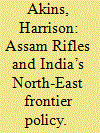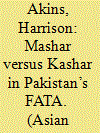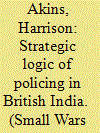| Srl | Item |
| 1 |
ID:
173394


|
|
|
|
|
| Summary/Abstract |
The Assam Rifles, the oldest paramilitary group in India, was formed as a defensive force to protect tea estates from tribal raiding. Following independence, the Indian government reversed British policy in the North-East frontier to extend administrative control over tribal areas that were largely neglected under colonial rule. In aid of this policy change, the government shifted the role of the Assam Rifles to an offensive counterinsurgency force. Based on primary sources, this analysis helps to demonstrate how post-colonial states co-opt colonial institutions to reflect new policies and the use of coercive force by paramilitary groups in the state-making process.
|
|
|
|
|
|
|
|
|
|
|
|
|
|
|
|
| 2 |
ID:
163227


|
|
|
|
|
| Summary/Abstract |
In 2016, Pakistan introduced a five-year plan to repeal the Frontier Crimes Regulation of the Federally Administered Tribal Areas and integrate the region into the Khyber Pakhtunkhwa Province. The political conflict between mashar (elders), who are advantaged by the law, and kashar (youth), who are disadvantaged by it, has been an obstacle to reform. This article also demonstrates that this conflict has been an endemic feature of the law since its establishment by British authorities in 1901.
|
|
|
|
|
|
|
|
|
|
|
|
|
|
|
|
| 3 |
ID:
191053


|
|
|
|
|
| Summary/Abstract |
Within British India, the police were used to suppress challenges to colonial authority. Yet, police actions in fulfilling this role varied by region. Within the provinces, the police were a coercive force to enforce internal security, augmenting military efforts. On the frontier, the aim of the police was to integrate locals into the local security framework and weld their interests to government control, rather than the direct application of force. Relying on Indian archival records, this comparative analysis demonstrates the importance of considering this variation for a more complete understanding of the strategic logic of colonial policing.
|
|
|
|
|
|
|
|
|
|
|
|
|
|
|
|
| 4 |
ID:
174771


|
|
|
|
|
| Summary/Abstract |
Scholars have argued that governments rely on pro-government militias forces due to low state capacity or international pressure that limits how they use military force within the context of civil wars. This article argues that governments also strategically use militias both inside and outside of civil wars to support the political legitimacy of local systems of governance in developing states, especially in peripheral areas with limited government control. This suggests that long-term political motivations need to be considered alongside short-term tactical goals for a comprehensive understanding of militia support. This theory is supported by case studies of Pashtun tribal militias in British India and Pakistan based on archival research, interviews, and relevant secondary sources.
|
|
|
|
|
|
|
|
|
|
|
|
|
|
|
|
| 5 |
ID:
178929


|
|
|
|
|
| Summary/Abstract |
With an increased focus on the role of pro-government militias in understanding intra-state conflict, scholars have primarily argued that states use militias as a proxy of the government because of low capacity or as a means of avoiding responsibility for violence against civilians. However, states with both high capacity and a willingness to commit violence against civilians have also relied upon pro-government militias in counterinsurgency operations. This paper argues that states involved in enduring interstate rivalries are more likely to use pro-government militias in order to reserve conventional military forces for potential conflict with their rival. Based on a case study of India’s Kashmir insurgency and logit analysis of pro-government militia data from 1981 to 2001, the findings provide empirical support for this theory and are robust to alternative measures and model specifications.
|
|
|
|
|
|
|
|
|
|
|
|
|
|
|
|